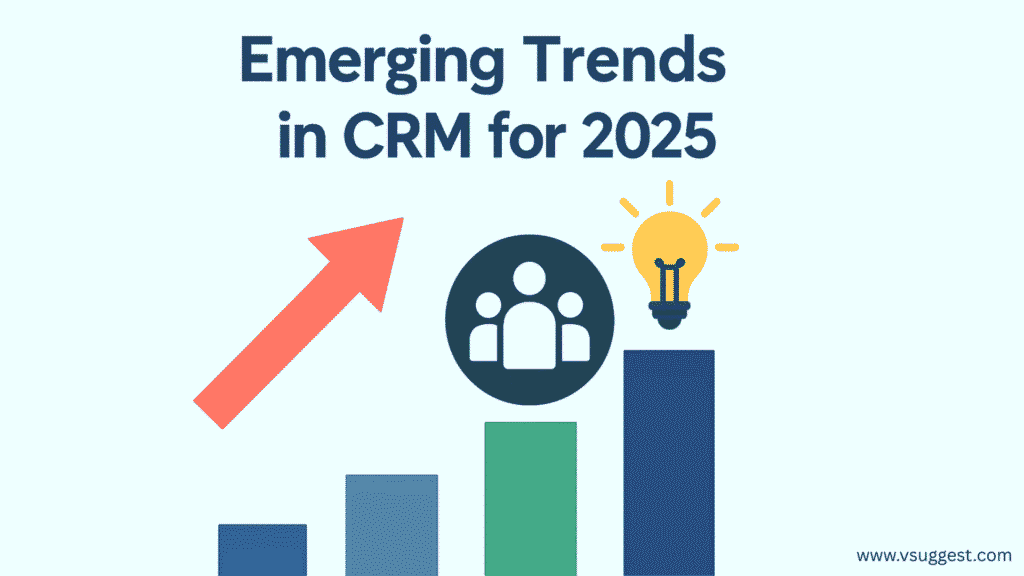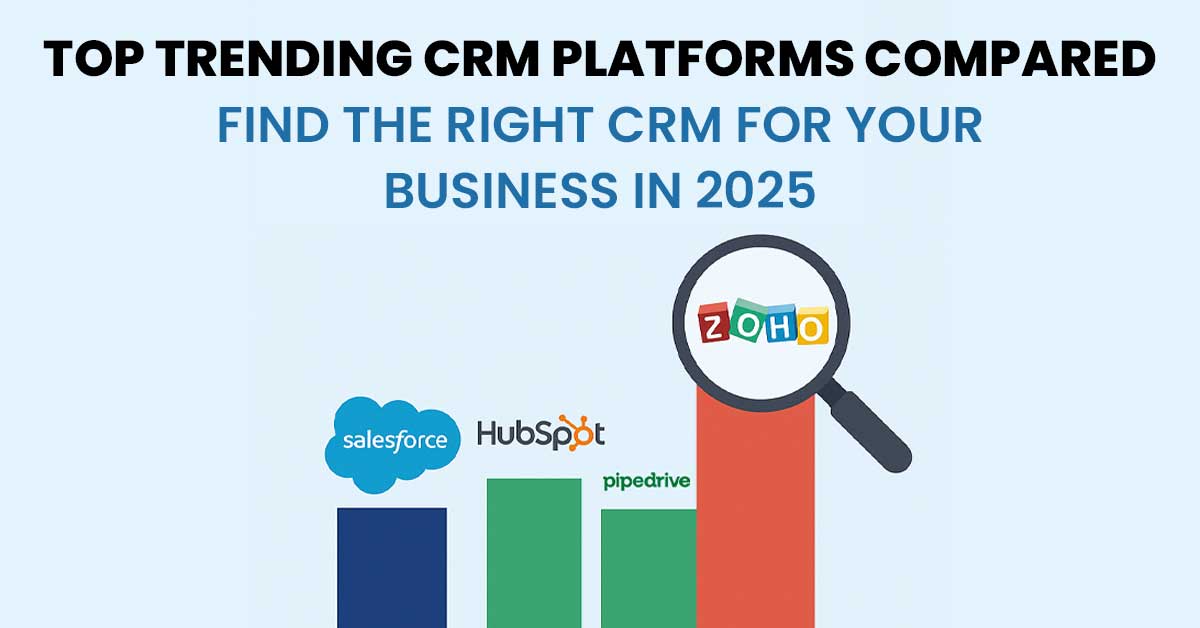In today’s competitive landscape, Customer Relationship Management (CRM) platforms have become essential tools for businesses looking to streamline operations, boost customer satisfaction, and increase sales. Picking the best CRM platform can be challenging given the vast range of choices available.
To help, we’ve compared the top trending CRM platforms in 2025 based on features, pricing, user experience, and scalability.
This guide is perfect for businesses looking for the best CRM software 2025, top-rated CRM platforms, and affordable CRM solutions to stay ahead of the competition.
Why Choosing the Right CRM Matters
CRM systems enable businesses to streamline customer interactions, automate processes, and gain insights into sales and marketing performance. An effective CRM enhances team collaboration, minimizes manual tasks, and supports data-driven decision-making. Whether you’re a solo entrepreneur or a large organization, choosing the right CRM can greatly boost your business growth and efficiency.
CRM platforms can:
- Centralize customer information
- Automate repetitive tasks
- Enable targeted marketing campaigns
- Improve sales forecasting accuracy
- Enhance customer support and retention
1. Salesforce – Best for Enterprise-Level Businesses
Salesforce remains the industry leader in CRM solutions. Known for its robust customization options and powerful integrations, it’s ideal for large enterprises.
Key Features:
- AI-powered insights with Salesforce Einstein
- Extensive third-party app integrations
- Highly customizable dashboards and reports
- Scalable architecture for growing teams
- Industry-specific CRM solutions
| Pros | Cons |
| ✅ Unmatched functionality and flexibility | ❌ High learning curve |
| ✅ Strong community and support network | ❌ Expensive for small businesses |
| ✅ Ideal for complex sales pipelines | ❌ Setup can be time-consuming without expert help |
| ✅ Rich app ecosystem via AppExchange |
Salesforce is highly adaptable across industries such as finance, healthcare, and retail, offering industry-specific solutions and unmatched depth in customization.
2. HubSpot CRM – The Best Free CRM Choice for Startups
HubSpot CRM is a favorite among startups and small businesses due to its generous free plan and user-friendly interface.
Key Features:
- Free CRM tools with unlimited users
- Marketing automation and email tracking
- Real-time pipeline management
- Lead generation and nurturing tools
- Seamless integration with HubSpot’s full ecosystem
| Pros | Cons |
| ✅ Easy to set up and use | ❌ Advanced features are restricted in the free version. |
| ✅ Free forever plan available | ❌ Paid upgrades can get costly as you scale |
| ✅ Excellent for inbound marketing | ❌ Limited customization on lower tiers |
| ✅ Strong knowledge base and community support |
Best For: Startups, freelancers, and small businesses
Unique Edge: HubSpot’s CRM effortlessly bridges the gap between marketing and sales teams, making it perfect for inbound-focused organizations and fast-paced growth environments.
One of the top-rated CRM platforms for beginners and growing startups.
3. Zoho CRM – Most Versatile for SMBs
Zoho CRM provides a cost-effective, adaptable solution designed for small and medium-sized enterprises..
Key Features:
- Multichannel communication (email, phone, social media)
- Sales automation and forecasting
- AI-powered sales assistant (Zia)
- Mobile CRM app
- Integration with 45+ Zoho apps
Best For: SMBs looking for a balance of price and performance
Unique Edge: Zoho CRM integrates seamlessly with other Zoho apps, offering an all-in-one ecosystem for business operations, including finance, HR, and marketing.
Ideal for companies looking for affordable CRM solutions without compromising on features.
4. Pipedrive – Best for Sales-Focused Teams
Pipedrive is designed specifically with salespeople in mind, offering a highly visual and intuitive pipeline management experience.
Key Features:
- Drag-and-drop sales pipeline
- Activity and goal tracking
- Email and call integration
- Custom sales reports and forecasting tools
- Smart contact data enrichment
| Pros | Cons |
| ✅ Intuitive and user-friendly | ❌ Limited marketing features |
| ✅ Great automation features | ❌ Fewer integrations than competitors |
| ✅ Strong focus on conversions | ❌ Not ideal for complex, multi-department workflows |
| ✅ Highly visual and interactive dashboards |
Ideal For: Sales teams focused on tracking deals and driving closures
Unique Edge: Pipedrive’s simplicity and focus on sales efficiency make it ideal for fast-paced, deal-driven environments where closing deals quickly is the top priority.
Recognized among the trending CRM systems for sales-driven businesses in 2025.
5. Monday Sales CRM – Ideal for customize Workflows
Built on the versatile Monday.com platform, Monday Sales CRM excels in its adaptability and capacity to craft tailored workflows for businesses of all sizes.
Key Features:
- Highly customizable pipelines
- Visual boards and task management
- Email sync and activity tracking
- Automation and integrations
- Time tracking and document storage
| Pros | Cons |
| ✅ User-friendly and visually appealing | ❌ Lacks some advanced CRM features |
| ✅ Great for project-based businesses | ❌ Pricing can add up with add-ons |
| ✅ Flexible templates for diverse needs | ❌ Limited analytics in base versions |
| ✅ Built-in project collaboration tools |
Perfect For: Teams looking for a tailored CRM with built-in project management tools.
Unique Edge: Its visual interface is perfect for teams that thrive on collaboration, transparency, and organized workflows—ideal for creative agencies, consultants, and marketing teams.
A leading choice in the 2025 CRM software rankings for its robust customization and collaboration capabilities.
Emerging Trends in CRM for 2025

- AI and Predictive Analytics: Platforms are increasingly adopting AI to help predict customer behavior, automate lead scoring, and personalize communication.
- Mobile CRM: Mobile-first solutions are on the rise, especially for remote and hybrid teams.
- Unified Platforms: CRMs that integrate marketing, sales, and customer service into one platform are becoming the norm.
- No-Code/Low-Code Customization: More platforms are offering no-code tools for businesses to customize their CRM without technical expertise.
- Voice-Activated CRM Assistants: Voice technology is beginning to reshape how reps interact with CRM systems.
- Data Privacy & Compliance Features: With data privacy becoming a priority, CRMs are incorporating better tools to help with compliance like GDPR, CCPA, etc.
Selecting the Best CRM for Your Business Needs
When selecting a CRM, consider the following:
- Business Size & Type: Large enterprises may need robust customization, while small businesses can benefit from simple, cost-effective tools.
- Mobile CRM: Mobile-first solutions are on the rise, especially for remote and hybrid teams.
- Unified Platforms: CRMs that integrate marketing, sales, and customer service into one platform are becoming the norm.
- No-Code/Low-Code Customization: More platforms are offering no-code tools for businesses to customize their CRM without technical expertise.
- Voice-Activated CRM Assistants: Voice technology is beginning to reshape how reps interact with CRM systems.
- Data Privacy & Compliance Features: With data privacy becoming a priority, CRMs are incorporating better tools to help with compliance like GDPR, CCPA, etc.
Collaboration Features: Opt for CRM Platforms That Support Cross-Departmental Teamwork
- Scalability: Choose a CRM that expands with your business growth.
- Integration Capabilities: Choose a CRM that seamlessly connects with your existing tools.
- Support & Training: Look for CRMs that offer good onboarding, tutorials, and responsive customer service.
If you’re searching for the top CRM provider in 2025, make sure it aligns with your long-term goals.
Final Thoughts: Which CRM is Right for You?
The best CRM for your business depends on your goals, team size, and budget.
- Need a powerful all-in-one solution? Go with Salesforce.
- Just starting out? HubSpot CRM offers the best free plan.
- Balancing cost and features? Check out Zoho CRM.
- Focused on sales pipeline efficiency? Pipedrive is your tool.
- Want workflow customization? Monday Sales CRM fits the bill.
Choosing the right CRM today can set the foundation for long-term growth and stronger customer relationships tomorrow. Take time to assess your specific business needs, test a few platforms, and invest in the CRM that aligns with your future vision.
